The Best HubSpot Alternatives to Try Out in 2025
.avif)
HubSpot is one of the most prominent marketing automation and CRM players. It integrates all your customer service, marketing, and sales needs and offers a multitude of automation and AI-enabled features that streamline business operations.
However, no single solution fits every business perfectly. This alternatives guide explores the top HubSpot alternatives to HubSpot, depending on specific additional needs and/or budget. Whether you're a small startup looking for cost-effective solutions, a mid-sized company seeking more customization, or an enterprise-level organization with complex integration needs, we've curated a list of platforms that offer compelling features, pricing, and capabilities.
This blog explores the alternatives to HubSpot that can potentially replace it as the primary CRM for your business, so let’s dive right in!
Why You Should be Looking at Alternatives to HubSpot
Despite the powerful CRM, Sales Hub, and the comprehensive suite of other tools and features provided by HubSpot, there are a lot of reasons why businesses look for other options and some big must-haves that HubSpot lacks. Some of these reasons are:
- Pricing: HubSpot Sales Hub’s advanced features such as custom reporting, automated workflows, etc. are only available on high-tier pricing plans, making the software rack up in price quite quickly for smaller teams and start-ups. For such organizations, software that doesn’t need a huge pricing increase for scaling up, such as EngageBay or Pipedrive.
- Customer Support: HubSpot’s advanced features library lacks user-friendliness and intuitiveness, which is a worry since a lot of users have complained about the quality of customer support- citing that there are often delays and the TAT for tickets is high even on urgent support requests.
- Feature Limitations: To get the full arsenal of features offered by HubSpot, a lot of money has to be shelled out, otherwise, the customization options, creation of dashboards, analytics and reporting capabilities, etc. all stay pretty limited. There are HubSpot alternatives in the market that provide the same functionality at a more affordable price, such as Insightly.
- User-Friendliness: Users of HubSpot Sales Hub have reported that the email builder is restrictive and clunky, dashboards cannot be customized and are not intuitive, and the overall platform lacks user-friendliness and intuitiveness. For a platform that is capable of so much, this is a big hurdle since users have to invest a lot of time and effort into training how to use the software properly to utilize its full potential.
Since we have captured the primary reasons for which users search for HubSpot alternatives, let’s get down to the platforms that have the potential to replace HubSpot as the primary platform for sales, marketing, and customer service.
The 10 Best HubSpot Alternatives for 2025
1. EngageBay

EngageBay is an all-in-one platform that unites marketing, sales, and support features into one powerful suite designed to handle all your software needs. EngageBay can do email marketing automation, marketing automation, CRM and sales tracking, handle live chats, appointment booking, and a wide range of other actions with zero complexity. What makes EngageBay one of the best HubSpot alternatives is the no-hassle affordable range of features that can take care of almost all your business needs, just like HubSpot.
⭐G2 Rating: 4.6/5 (350+ Reviews)
⭐Capterra Rating: 4.7/5 (800+ Reviews)
Key Features and Benefits
- A comprehensive marketing bay with marketing automation features such as unlimited landing pages, lead list forms, drag-and-drop automation builder, etc.
- Email marketing features with email builders, drip campaigns, email analytics, lead scoring, targeting, segmenting, and management.
- Free 360° coverage CRM (free) with lead and deal management, appointment scheduling, contact management, and complete visibility into the complete customer journey.
- Free calling features and call management services directly through the free plan on its CRM.
- Automated support features and services such as a free helpdesk, free live chat features, support groups, custom ticket views, etc.
- Customized push notification support with intelligent analytics and features to lead prospects down your marketing funnel.
- Web form builder with a huge library of templates to choose from, with drag-and-drop form builder functionality and verification follow-ups as well (optional).
- Intelligent CRM and email integration to manage all email-produced leads directly from a single platform.
Potential Drawbacks
- Some users have reported that they could work more on their reporting and analytics features and also make them more appealing.
- Some users have also reported that their customizability is limited and so is the feature set on the mobile app, which is considerably behind their web platform.
2. Pipedrive

Pipedrive is a sales-focused CRM platform designed to help businesses streamline their sales processes and manage customer relationships more effectively. The platform focuses on visual pipeline management and provides intuitive tools to help sales teams track and close deals more efficiently. It is perhaps the most popular CRM on this list of HubSpot alternatives because of its strong feature set.
⭐G2 Rating: 4.3/5 (2000+ Reviews)
⭐Capterra Rating: 4.5/5 (3000+ Reviews)
Key Features and Benefits
- Sales Pipeline Management with a visual, drag-and-drop interface for tracking deals across multiple stages
- Advanced deal tracking with custom fields, activity reminders, and automated workflow creation
- Contact and lead management with comprehensive contact information storage and tracking
- Email integration allows direct email communication and tracking within the CRM platform.
- Customizable sales reporting and analytics with detailed performance insights
- Lead generation tools including web forms and lead capture integrations
- Activity scheduling and task management directly linked to specific deals and contacts
- Mobile app for on-the-go sales tracking and management
- Extensive integration capabilities with over 300 third-party tools including Google Workspace, Mailchimp, and Slack
- Automated workflow and process management to reduce manual data entry and follow-up tasks
Potential Drawbacks
- Some users report that advanced reporting features require higher-tier pricing plans.
- Limited marketing automation capabilities compared to full-suite CRM platforms.
- Some users find the initial setup and customization process to be complex.
3. Agile CRM
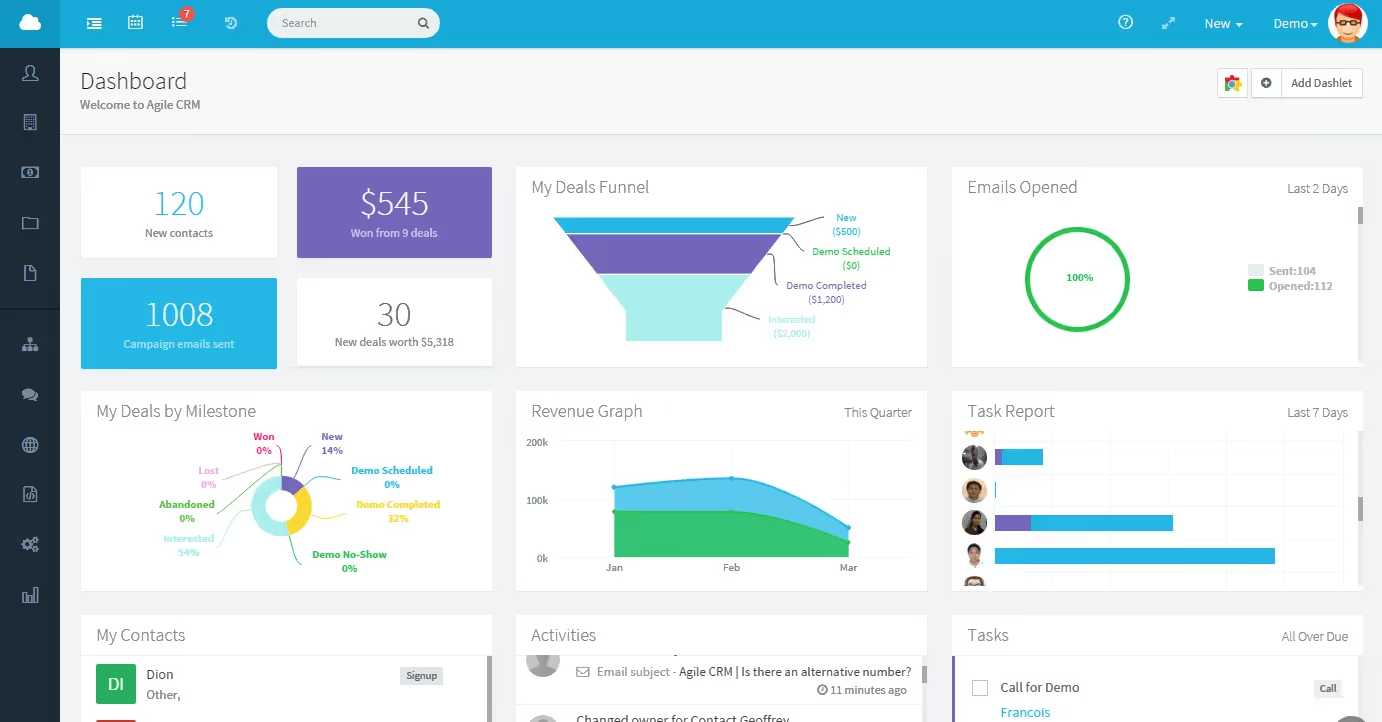
Agile CRM is an all-in-one platform that unites sales, marketing, and service automation features into a comprehensive solution designed to streamline business processes. Agile CRM can handle contact management, marketing campaigns, sales tracking, and customer service interactions with an integrated approach. What makes Agile CRM stand out in this list of HubSpot alternatives is its ability to provide multiple business functions within a single platform at competitive pricing.
⭐G2 Rating: 4/5 (350 Reviews)
⭐Capterra Rating: 4.1 (500+ Reviews)
Key Features and Benefits
- Sales automation with visual pipeline management and deal tracking features, allowing users to drag and drop deals between stages and prioritize high-value opportunities.
- Marketing automation platform features include sophisticated email campaigns, web engagement tracking, lead scoring capabilities, and automated marketing workflows to nurture potential customers through the sales funnel.
- Integrated telephony system with automatic call logging, call tracking, voice broadcasting, and integrated communication tools that enable seamless customer interaction and follow-up.
- Web form builder with customizable lead capture templates, integration options, and intelligent form routing to appropriate sales team members.
- Social media interaction tracking and management across multiple platforms, enabling comprehensive customer communication and engagement monitoring.
- Comprehensive contact management with 360-degree customer interaction history, providing detailed insights into customer relationships and communication patterns.
- Workflow automation with intelligent task scheduling, reminder systems, and automated follow-up mechanisms to improve sales team productivity.
Potential Drawbacks
- Some users have reported that the user interface can be complex and overwhelming.
- Limited depth of integrations compared to some larger CRM platforms.
- Customer support responsiveness has mixed reviews.
4. Freshsales

Freshsales is an all-in-one CRM platform designed to help businesses streamline their sales processes, manage customer relationships, and drive growth through intelligent features. Developed by Freshworks, the platform offers a comprehensive solution that combines sales automation, contact management, and communication tools into a single, user-friendly interface. It is on the list of HubSpot alternatives as its communication and territory management features are great for organizations to scale up without much worry.
⭐G2 Rating: 4.5/5 (1200+ Reviews)
⭐Capterra Rating: 4.5/5 (600+ Reviews)
Key Features and Benefits
- Advanced contact and lead management with AI-powered lead scoring and automatic data enrichment capabilities.
- Comprehensive sales pipeline visualization with drag-and-drop deal management and customizable sales stages.
- Built-in phone and email communication tools with automatic call logging, recording, and communication tracking.
- Intelligent workflow automation that enables custom triggers, actions, and sales process optimization.
- Web form integration and lead capture tools with seamless CRM synchronization and routing mechanisms.
- Detailed sales analytics and reporting with customizable dashboards and performance insights.
- Email tracking and engagement monitoring with real-time notifications and interaction history.
- Territory management and team collaboration features with role-based access controls.
Potential Drawbacks
- Some users report that advanced reporting features require higher-tier pricing plans.
- Integration capabilities can be limited compared to more extensive CRM platforms.
- Complex customization may require technical expertise.
5. Pipefy

Pipefy is an all-in-one workflow management platform designed to help businesses automate and streamline their processes across departments. The platform provides a flexible, visual approach to managing work, enabling teams to create, track, and optimize their workflows with ease and precision. They also excel in providing customer service and customer experience-based features, leading to a holistic customer capture and experience arsenal. Its visual management and drag-and-drop functionality make it one of the strongest HubSpot alternatives in terms of ease of use.
⭐G2 Rating: 4.6/5 (200+ Reviews)
⭐Capterra Rating: 4.6/5 (300+ Reviews)
Key Features and Benefits
- Comprehensive workflow management with customizable process templates for various business departments and functions.
- Visual workflow designer with a drag-and-drop interface for creating complex, multi-stage processes and automation rules.
- Advanced task and project tracking with detailed activity logs, assignment capabilities, and progress monitoring.
- Integrated forms and data collection tools with intelligent routing and automatic workflow triggers.
- Cross-department collaboration features enabling seamless communication and work handoffs.
- Powerful reporting and analytics dashboard with real-time performance insights and process optimization recommendations.
- Extensive integration capabilities with popular business tools like Slack, Google Workspace, and Microsoft platforms.
- Compliance and governance features with detailed audit trails and access control mechanisms.
Potential Drawbacks
- Some users report that the learning curve can be steep for workflow designs.
- Premium features require higher-tier pricing plans.
- Performance can be slower with extremely complex or large-scale workflows.
6. Nimble

Nimble is a simple yet powerful CRM platform designed to help small businesses and teams build meaningful relationships and manage customer interactions effectively. It combines contact management, social insights, and marketing automation into a unified, intuitive interface. It is a CRM for more than just salespeople and is designed to encourage more interactions than just sales pitches. Its strong focus on engaging conversations makes it one of the most distinct HubSpot alternatives.
⭐G2 Rating: 4.5/5 (1000+ Reviews)
⭐Capterra Rating: 4.4 (1800+ Reviews)
Key Features and Benefits
- A unified contact management system that consolidates contact details, email history, social interactions, and calendars into one place.
- Social profile matching and enrichment, pulling relevant information from platforms like LinkedIn, Twitter, and Facebook.
- Task and activity tracking tools for managing follow-ups, scheduling reminders, and assigning tasks within teams.
- Pipeline management with customizable deal stages and drag-and-drop functionality for visualizing sales progress.
- Email marketing integration, allowing bulk email sends with tracking features such as open rates and click-throughs.
- Smart social search and segmentation tools for targeted outreach and customer engagement.
- Extensive integrations with popular tools like Microsoft 365, Google Workspace, Mailchimp, and Zapier for seamless connectivity.
- Mobile-friendly design with cross-device syncing for managing relationships on the go.
Potential Drawbacks
- Limited advanced features compared to enterprise-grade CRM solutions.
- Social integration features can vary in performance depending on platform updates.
- Reporting and analytics options are more basic compared to some competitors.
7. Insightly
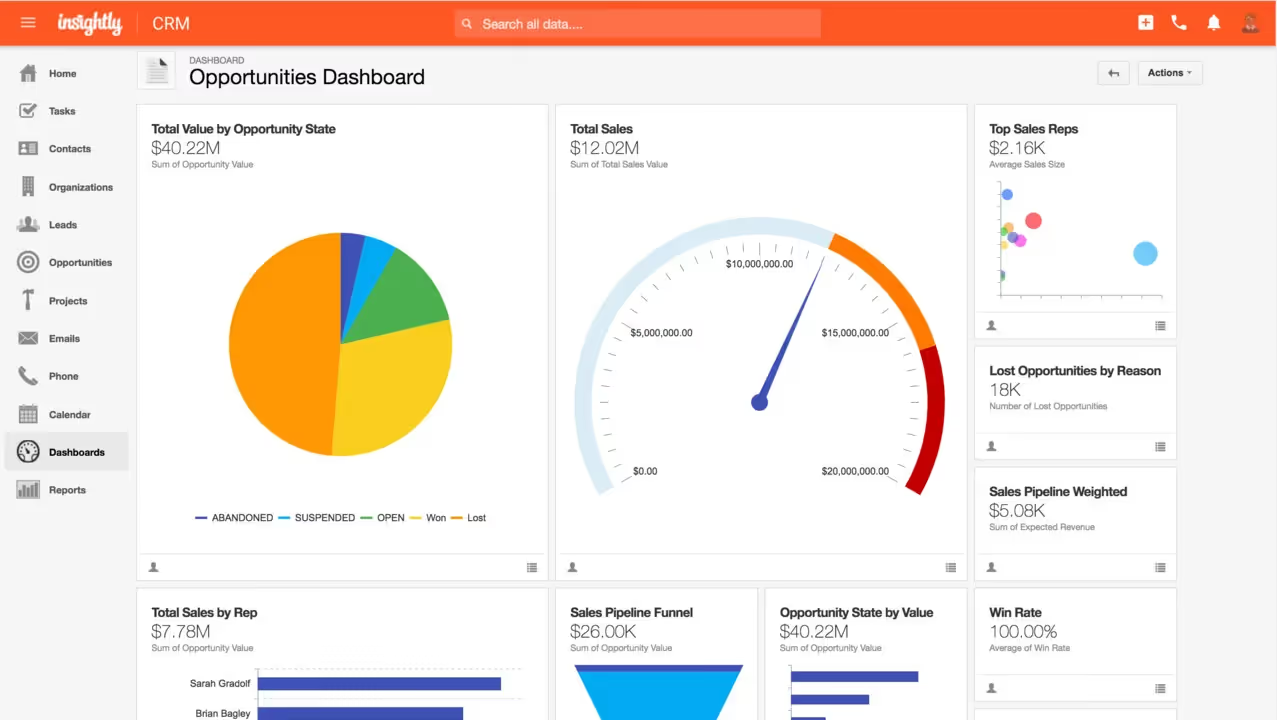
Insightly is a versatile CRM and project management platform designed to help businesses nurture customer relationships, manage projects, and streamline workflows. It offers a comprehensive suite of tools tailored for small—to mid-sized businesses seeking an all-in-one solution for sales, marketing, support, and operational efficiency. Its strong project management and operational workflows are enough for it to make it here on the list of HubSpot alternatives.
⭐G2 Rating: 4.2 (900+ Reviews)
⭐Capterra Rating: 4/5 (650+ Reviews)
Key Features and Benefits
- Unified CRM and project management, enabling businesses to manage customer relationships and execute projects in one platform.
- Advanced lead and opportunity tracking with customizable pipelines, automatic alerts, and reminders.
- Workflow automation capabilities with visual process builders for task automation and email triggers.
- Built-in email tracking and template creation for personalized, data-driven customer communications.
- Integrated project management tools for task assignments, milestone tracking, and collaboration.
- Marketing automation and journey builder features, along with landing pages and forms, and intelligent analytics on a visual dashboard.
- Dynamic reporting dashboards for real-time insights into sales, project progress, and business performance.
- Seamless integration with Google Workspace, Microsoft 365, QuickBooks, and popular marketing tools.
- Mobile application for managing contacts, tasks, and deals while on the go.
Potential Drawbacks
- Limited scalability for large enterprises or businesses with highly complex requirements.
- A bundle of sales, marketing, and service (Insightly all-in-one) can be fairly expensive for smaller businesses.
- Users may experience a steeper learning curve when setting up complex workflows.
8. Mailchimp CRM
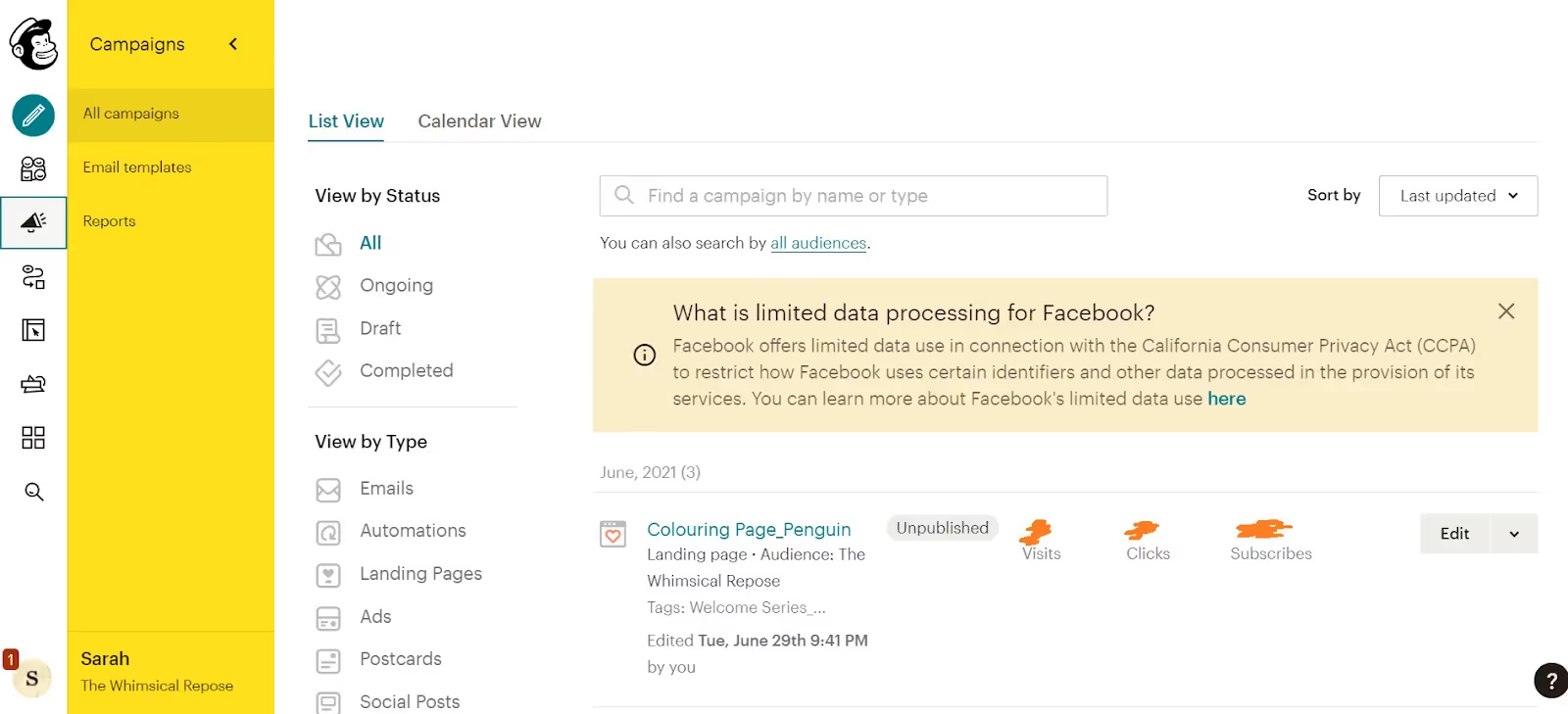
Mailchimp CRM is a lightweight customer relationship management solution built into the Mailchimp ecosystem, primarily designed for small businesses focused on marketing and email campaigns. It combines audience management and marketing tools to enable businesses to grow their relationships effectively. It is one of the strongest email marketing platforms ever, which makes it one of the most solid HubSpot alternatives for email marketing-focused CRMs.
⭐G2 Rating: 4.4/5 (5000+ Reviews)
⭐Capterra Rating: 4.5/5 (17000+ Reviews)
Key Features and Benefits
- Audience segmentation with tags, custom fields, and behavioral insights for targeted marketing.
- Email campaign management with personalized templates, automation, and A/B testing capabilities.
- Marketing automation software for creating journeys, scheduling campaigns, and delivering drip emails.
- Comprehensive contact profile views with engagement data, purchase history, and marketing preferences.
- Pre-built analytics and reporting tools for tracking campaign performance and audience behavior.
- E-commerce integrations for syncing sales and customer data from platforms like Shopify, Alidrop, WooCommerce,and BigCommerce.
- Mobile app for managing campaigns and monitoring performance on the go.
- Free version availability with essential CRM and marketing features for businesses starting out.
Potential Drawbacks
- Not a full-featured CRM; advanced sales and service management capabilities are limited.
- Designed primarily for marketing use cases, making it less suitable for comprehensive customer relationship management.
9. Copper CRM
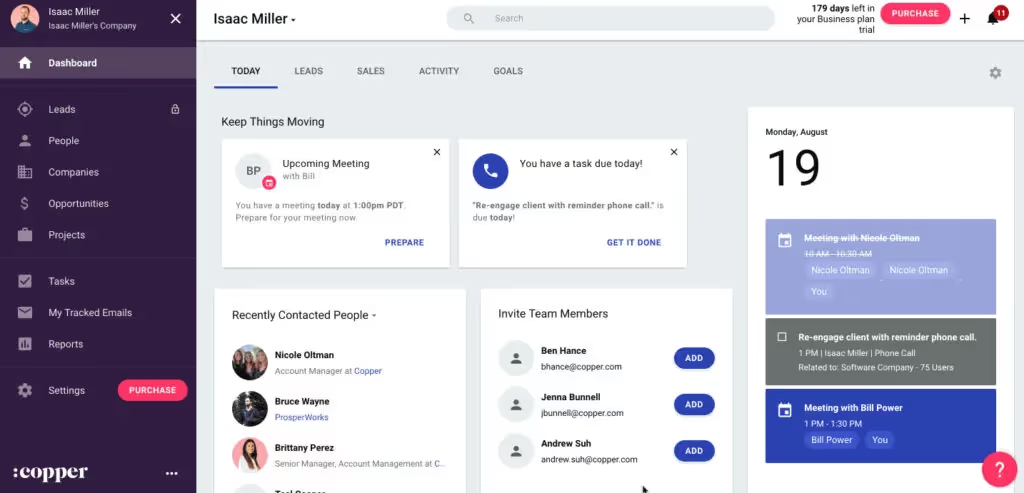
Copper CRM is a relationship-centric CRM platform specifically designed for businesses that rely heavily on Google Workspace. It focuses on simplifying customer relationship management by tightly integrating with Gmail and other Google tools. Its joint functionality with Google Workspace is what makes it a worthy contender on this list of HubSpot alternatives.
⭐G2 Rating: 4.5/5 (1100+ Reviews)
⭐Capterra Rating: 4.4/5 (500+ Reviews)
Key Features and Benefits
- Native integration with Google Workspace, allowing seamless contact, email, and calendar syncing.
- Contact and lead management with automated data entry and customizable pipelines for tracking deal progress.
- Email tracking, templates, and scheduling for efficient communication.
- Workflow automation to streamline repetitive tasks and notifications.
- Activity tracking and reminders integrated into Google Calendar for better task management.
- Visual reporting dashboards with insights into sales performance, deal status, and team productivity.
- Mobile app with cross-device syncing for managing relationships anytime, anywhere.
- Easy setup with minimal IT resources required, making it ideal for small to medium-sized businesses.
Potential Drawbacks
- Limited advanced features compared to larger CRM platforms.
- Dependence on Google Workspace may not suit businesses using other productivity tools.
- Customization options may not meet the needs of more complex use cases.
10. SugarCRM
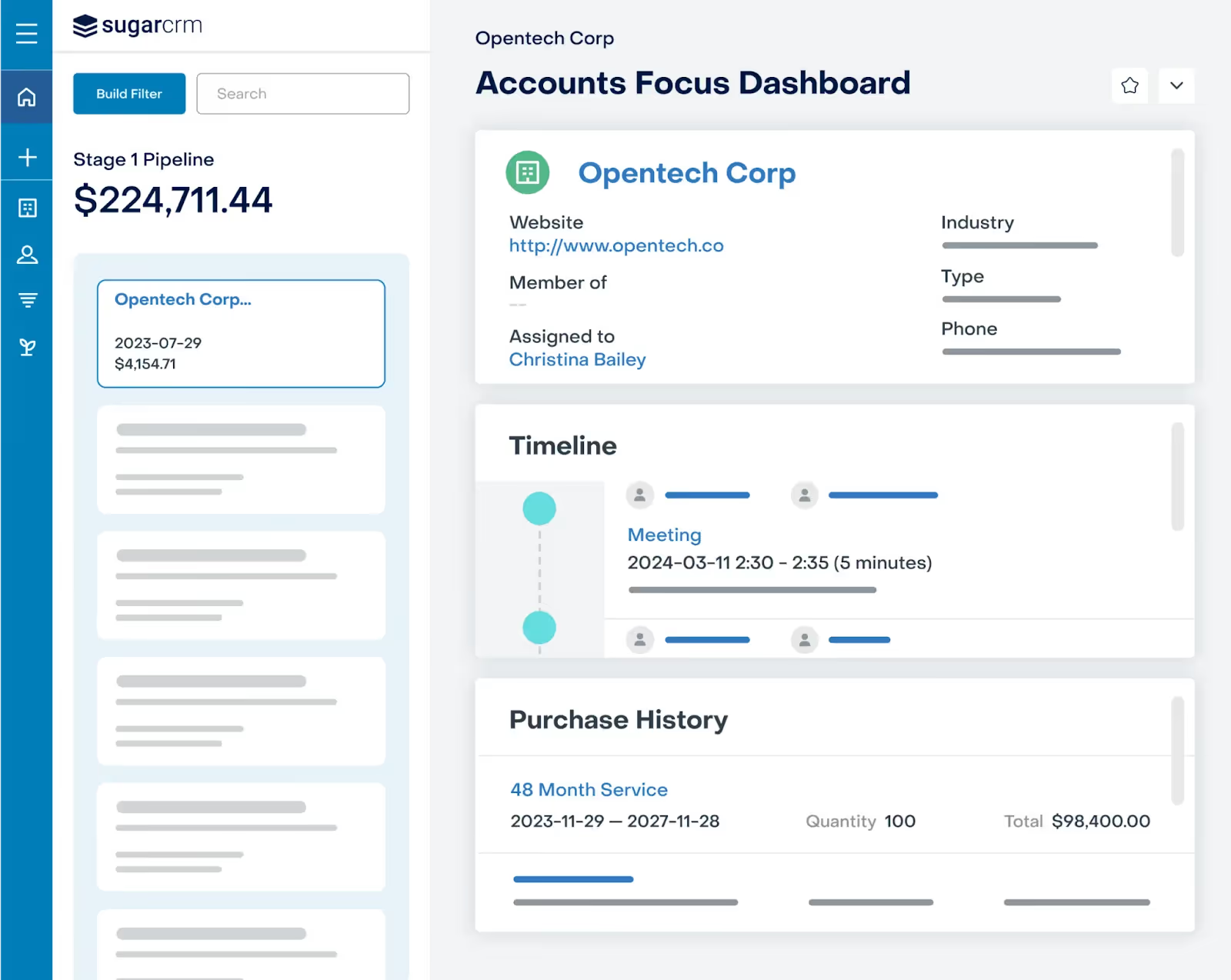
SugarCRM is a highly customizable CRM solution designed to cater to businesses of all sizes, offering robust tools for sales, marketing, and customer service. Its flexibility and open-source roots make it a favorite among organizations with unique needs and technical expertise and solidify its place on this list of HubSpot alternatives.
⭐G2 Rating: 3.8/5 (750+ Reviews)
⭐Capterra Rating: 3.8/5 (400+ Reviews)
Key Features and Benefits
- Comprehensive sales automation with lead management, opportunity tracking, and pipeline visualization.
- Marketing automation capabilities for campaign creation, email marketing, and lead scoring.
- Customer service tools for ticket management, case resolution, and customer support insights.
- Advanced reporting and analytics with customizable dashboards for real-time business insights.
- Extensive customization options with APIs, workflows, and open-source architecture for tailored solutions.
- Integration capabilities with popular third-party tools like Mailchimp, Slack, and Microsoft Dynamics.
- Mobile CRM features for managing sales and customer data on the go.
- Strong focus on data privacy and security with enterprise-grade compliance features.
Potential Drawbacks
- Steep learning curve and requires technical expertise for advanced customization and integration.
- Steeper pricing compared to some alternatives, especially for small businesses.
Wrapping Up
Automation and AI-enabled platforms are growing at an all-time high rate. Businesses have a plethora of options to choose from now, and some options cater to niche needs too. HubSpot has emerged as a leader in marketing automation and AI-enabled customer platforms. It has a ton of software offerings that cater to marketing, sales, and customer support, and its CRM (Sales Hub) is one of the most widely used CRMs in the world, making the jump to its other software offerings much easier.
The tools listed above are CRM options that give tough competition to HubSpot in core areas such as pricing, customizability, functionality, customer support, or intuitiveness. They can help businesses overcome problems caused by HubSpot throwing too wide of a net in feature offerings, and not being able to deliver what businesses need precisely.
FAQs
What is the best HubSpot alternative?
The ‘best’ HubSpot alternative depends upon your exact needs from the system. For example, Mailchimp’s CRM is best for email marketing needs, EngageBay is a more affordable all-in-one solution for small businesses, Pipefy is the best for project management needs in CRM, etc.
Who is HubSpot's biggest competitor?
Zoho CRM, Salesforce, and ActiveCampaign are some of HubSpot's biggest competitors. Other CRM platforms with specialized and intuitive features also compete with HubSpot, such as Pipefy, EngageBay, etc.
Is HubSpot a CRM or CMS?
HubSpot is both a CMS and CRM- It lets you create the perfect website experience for your visitors, and then also allows you to track visitor metrics, and log their details (like a normal CRM).
Is HubSpot similar to Zoho?
Yes, Zoho and HubSpot are both software suites that offer CRMs and a variety of other software for sales, marketing, customer support, etc.
What ERP is Google using?
Google uses SAP S/4HANA Cloud, SAP Ariba, and SAP HANA Enterprise Cloud. Google partnered with Oracle and used its ERP earlier, but switched to the SAP Cloud environment in April 2021.
Who owns Zoho CRM?
Zoho Corporation, the company that makes Zoho CRM, is a privately owned enterprise, started by Indian businessman Sridhar Vembu, along with his friends and siblings, in 1996. His sister, Radha Vembu, also owns a majority stake in the company.
Is HubSpot CRM free?
Yes, HubSpot’s CRM (HubSpot Sales Hub) is available in its base form for free (forever). It is only when you go for the advanced features that you have to start paying.

.webp)

.webp)

